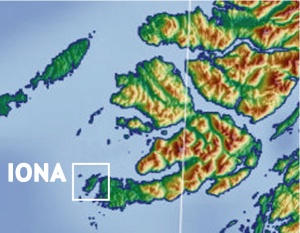Sant Dunchad
Un article de GrandTerrier.
1 Fiche signalétique
|
2 Almanach
| ||||||||||||||||||||
3 Sources
|
4 Iconographie | ||||||||||||||||||||
5 Monographies
Site Minihi.levenez
25/5 Dunchad s
Site Clan Duncan
It is here on Iona that we find one of the earliest mention of Dunchad (Duncan) the 11th Abbot of Iona 707 – 717AD
'St. Dunchadh (Dumhade, Dumhaid, Dunchad), Abbot of Iona. Died March 24, 717. Dunchadh was born into the line of Conall Gulban. He became a monk at Killochuir in southeast Ulster and, from 710 until his death, ruled the abbey of Iona, Scotland. During Dunchadh's abbacy, Saint Egbert (f.d. April 24) finally convinced the Celtic monks of Iona to adopt the Roman customs - tonsure, date of Easter, Benedictine Rule. For Saint Bede this was the final sign of unity from diversity, which was the main theme of his "Ecclesiastical History." Dunchadh is the titular saint of Killclocair, in the diocese of Armagh. His feast is still celebrated in Donegal on May 25; elsewhere it is March 24. He is the patron of sailors in Ireland'
Site NewAdvent :
St. Dunchadh
(DUNICHAD, DUNCAD, DONATUS)
Confessor, Abbot of Iona; date of b. unknown, d. in 717. He was the son of Ceannfaeladh and grandson of Maelcobha of the house of Conall Gulban. He is first heard of as Abbot of Killochuir on the coast of S.E. Ulster (perhaps Killough, County Down). There is considerable dispute as to the year in which he became Abbot of Hy (Iona). The "Annals of Ulster" first mention him in that capacity under the year 706 (really 707); but Conamhail was abbot from 704 to 710. It may be that St. Dunchadh was coadjutor to Conamhail (the phrase is principatum tenuit). Or perhaps there was some schism in the monastery over the paschal question, for though St. Dunchadh is said to have ruled from 710 till 717, in 713 the death of "St. Dorbaine Foda, Abbot of Ia" is recorded by the "Annals of the Four Masters", and the same authority relates the appointment of "Faelchu, son of Dorbene" to the abbacy in 714. It was this Faelchu who was certainly abbot from 717 to 724. Both of these, however, may have been really coadjutors to St. Dunchadh, or priors, or even bishops, for there were certainly bishops in Iona at that period, and the phrase employed is cathedram Iae obtinuit. However this may be, the paschal controversy was settled at Iona by the adoption of the Roman usage, while St. Dunchadh was abbot. This took place at the instance of St. Egbert, a Northumbrian priest, who had been educated in Ireland. He came to Iona in 716, and was at once successful in persuading the community to abandon the Celtic Easter and tonsure.
